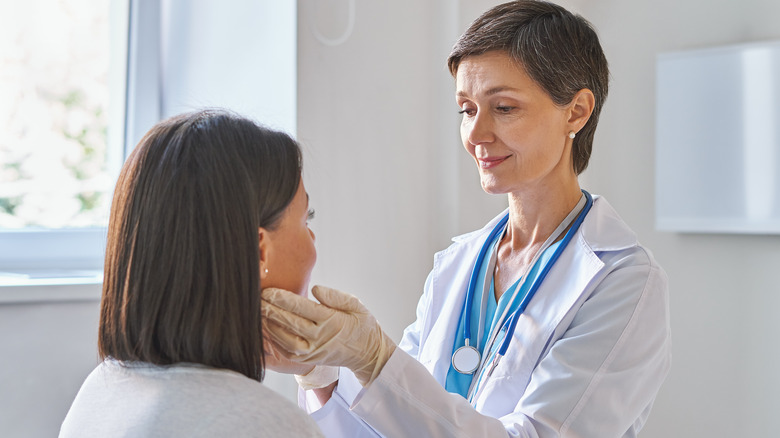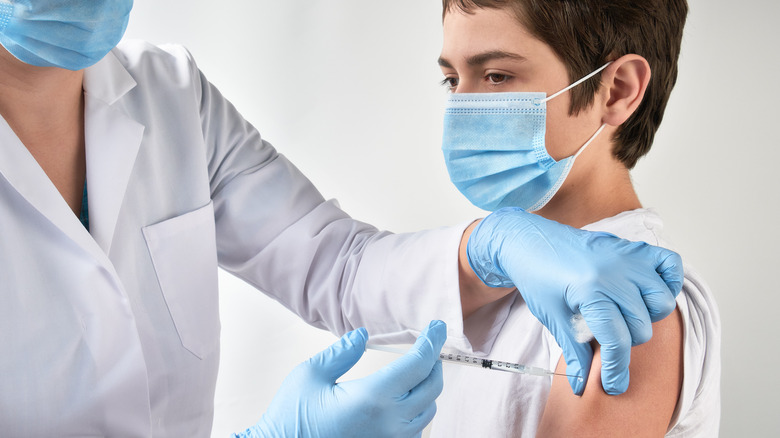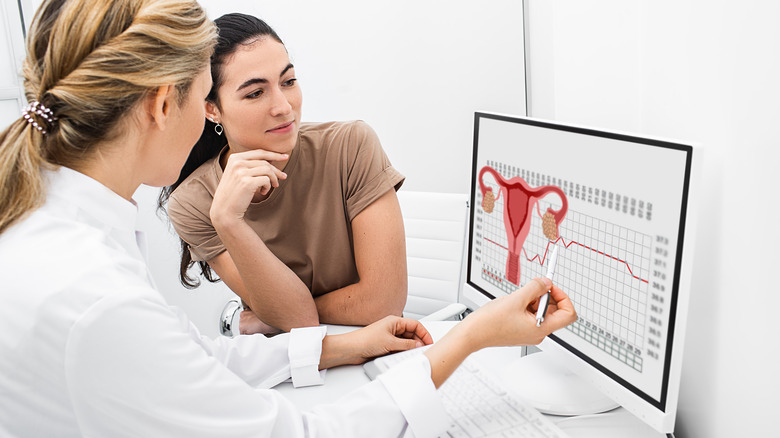The Most Important Health Exams To Get At Every Age
Knowing how often to see a doctor as you progress through life may seem perplexing at times. If you're not sick, is it even necessary? Health experts suggest it is, particularly for catching anything serious in the early stages. From the time we're babies, we're hopefully getting the right medical care. And here's what that looks like.
According to the U.S. Department of Health and Human Services, babies should have well visits a total of six times before their first birthday. This is an opportunity for doctors to check and make sure the baby is healthy. The doctor will also assess their development and check for any injuries or illnesses. During toddler years, it's recommended these youngsters see their doctors roughly seven times between ages 1 to 4 (via U.S. Department of Health and Human Services).
Other important exams in the early years include visits to the dentist. MindBodyGreen suggests the very first dental visit should happen right after the first tooth comes in. From there, the American Dental Association generally recommends getting teeth cleanings twice a year. Additionally, eye health becomes a priority from ages 3 to 5 and they should be checked at least once during this age range, according to the U.S. Preventive Services Task Force.
Health exams in your teenage years
As kids progress into puberty, their healthcare needs will evolve. A young woman's first visit to a gynecologist should be between the ages of 13 to 15, according to the American College of Obstetrics and Gynecologists. The first time around, the exam is a general physical and the external area of the genitals is also examined, per MindBodyGreen. A pelvic exam won't happen unless there is abnormal pain or bleeding. For young men, a full physical should happen during the same age range. Both sexes should see their doctor if they're going to start being sexually active.
At age 18, it's a good idea for all adults to get a complete blood workup and this should be conducted every six to 12 months. As a result, you and your doctor will know what your baseline health looks like and will be better positioned to catch anything that's off. It's also advised to get screened for skin cancer during yearly physicals.
Health exams for young adults
Once a woman turns 21, MindBodyGreen says it's imperative to start getting screened for cervical cancer by getting a Pap test every three years. Pelvic exams are also crucial after turning 21. According to the American College of Obstetricians and Gynecologists (ACOG), it's important to have a pelvic exam if your medical history calls for it, or if you're having abnormal symptoms like pain during sex.
Experiencing ongoing or unusual pain during intercourse can cause distress in women, but the ACOG says three out of every four women experience it at least once in their lifetime. MindBodyGreen says that endometriosis, vaginal dryness, a sexually transmitted disease, or vaginismus can all cause painful sex. It's important to discuss your symptoms with your doctor to get the appropriate treatment and care. Pelvic exams are generally not recommended for women who are asymptomatic or not pregnant.
Health exams for middle-aged adults
After turning 45, MindBodyGreen says it's time to get screened for colon cancer. Initially, the American Cancer Society recommended getting this taken care of at 50, but they recently changed that to 45 due to colon cancers happening in people at younger ages. Some signs and symptoms of colon cancer include a change in bowel habits, rectal bleeding, fatigue, and cramping. However, many people don't experience any symptoms at all in the early stages. That's why ongoing screening is so important.
The American Cancer Society recommends starting lung cancer screenings at age 50. Additional considerations include whether or not you're a smoker, or have quit within 15 years, or have a 20-pack year smoking history. If you fall into any of these criteria, your health care provider may recommend a low-dose CT scan to check for any abnormalities and recommend a smoking cessation program.
Special considerations for middle-aged men and women
The American Cancer Society recommends that men of average risk for prostate cancer should start getting screened at age 50. For men with a higher risk, their doctor may recommend they start screening as young as 40 or 45. Some increased risks exist if you're African-American or have a family history of prostate cancer. If prostate cancer runs in your family, especially if any first-degree relatives have had it, you may want to consider getting screened earlier.
According to the American College of Obstetricians and Gynecologists, women should get their first mammogram at the age of 40 and should continue to get checked every year or two. Women who are at high risk of breast cancer or who have a family history of the disease will want to consider being highly proactive and speaking with a doctor about cancer surveillance and a cadence that can help catch cancer in its early stages.
Health exams for seniors
According to WebMD, standard tests you'll want to get in your 60's and beyond include: blood pressure tests, colon cancer screenings, prostate cancer screenings for men, mammograms, Pap smears, HPV tests, and pelvic exams for women, eye exams to screen for glaucoma, macular degeneration, and cataracts, hearing tests, cholesterol screenings, and a one-time screening for abdominal aortic aneurysm for men who have ever smoked.
Additionally, the U.S. Preventive Services Task Force advises women who turn 65 to get screened for osteoporosis. If you're younger than 65 but have a higher risk for developing osteoporosis and you're postmenopausal, you can get screened, too. According to Mayo Clinic, osteoporosis is more prevalent in women than men and the older you get, the greater your risk is of developing it. Asian and white women are at the greatest risk as are people with smaller body frames. There isn't enough evidence to suggest the necessity of osteoporosis screenings for men.






